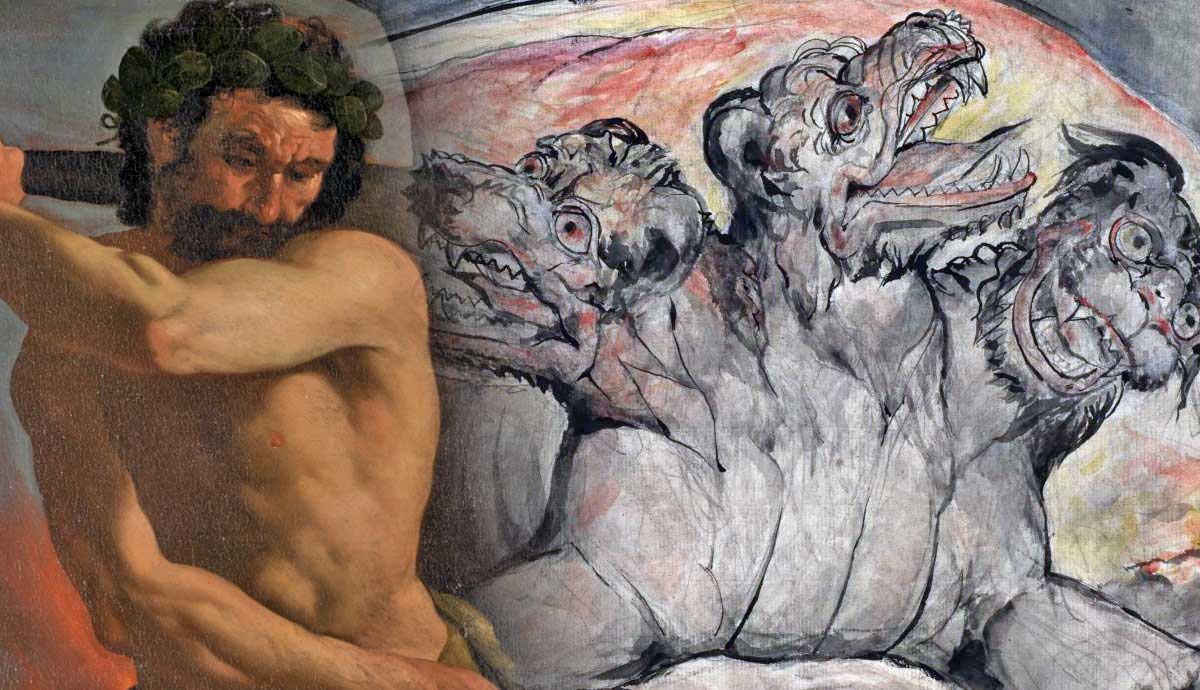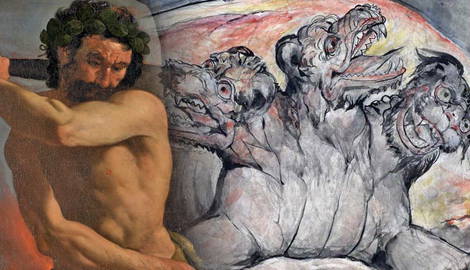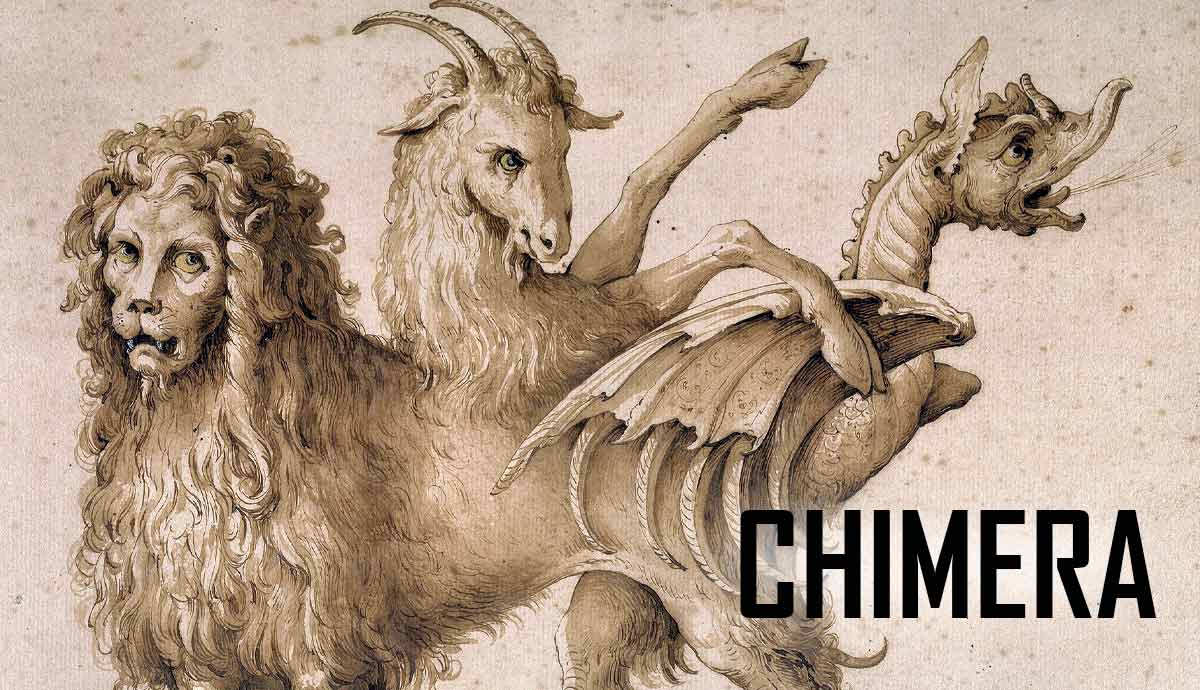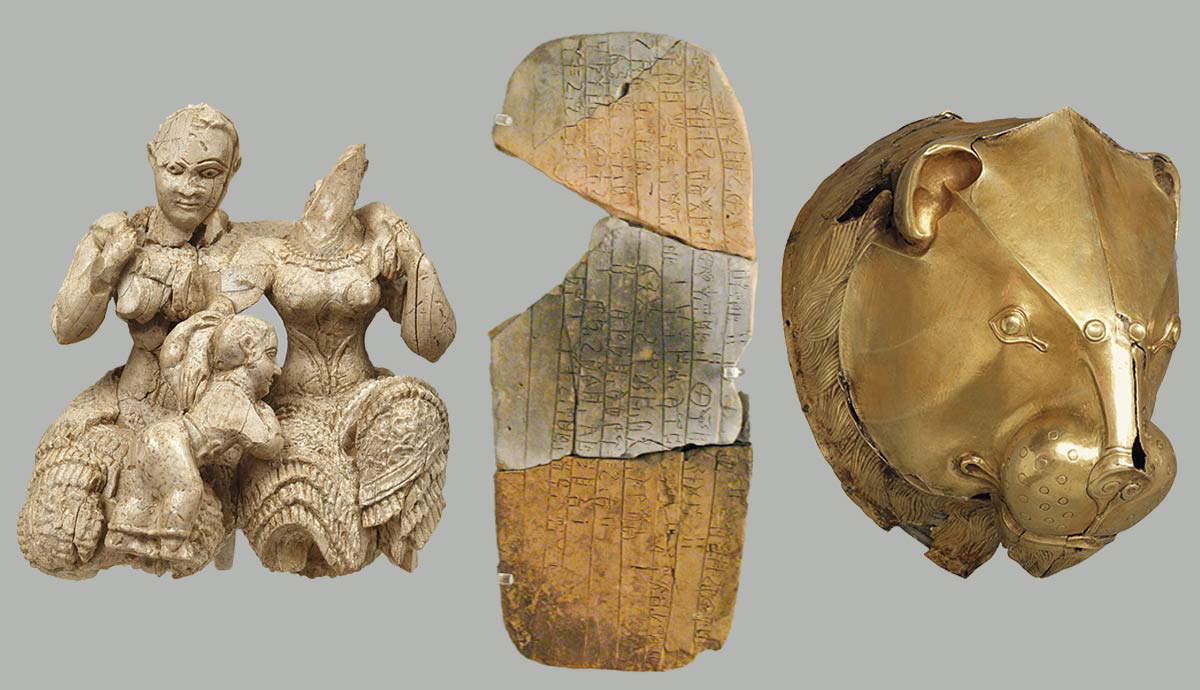
For his final task, Eurystheus ordered Heracles to go to the Underworld and bring back Cerberus, the three-headed guard dog of Hades. To enter Hades’s realm, Heracles underwent initiation into the secretive Eleusinian Mysteries. With Hermes’s guidance, Heracles ventured through the Underworld. Along the way, he rescued a fellow hero and encountered an old friend. Hades permitted Heracles to try to subdue his pet, but there was a catch. Read on to learn the story of Heracles’s descent into the underworld and how he captured the hound of Hades.
The Last Labor of Heracles

Standing outside the gates of Tiryns for the final time, Heracles awaited Eurystheus’s ultimate command: to capture Cerberus, the guard dog of Hades. Each of Eurystheus’s tasks had been designed to be insurmountable, yet Heracles had overcome them all. However, even the indomitable Heracles harbored doubts about the feasibility of this mission. Defying the impossible in the land of the living was one thing, but doing so in the realm of the dead was an entirely different challenge.
In ancient Greek mythology, the Underworld, home of the Chthonic gods, was not just a concept but a physical location hidden deep beneath the earth. It could be accessed through various sacred cave entrances. The act of a living person venturing into the land of the dead was known as a Katabasis, a descent into the Underworld. This theme is prevalent in many Greek myths, including the story of Heracles’s twelfth labor.
Hades, the king of the underworld, the god of the dead and riches, was inherently possessive and tightly held onto any souls within his domain. He entrusted Cerberus, his beloved three-headed hound, with the crucial task of guarding the entryways to the Underworld, ensuring none of his precious souls escaped. However, gaining entry into the Underworld was relatively straightforward. Hades welcomed the souls of any foolish mortals who dared to enter his realm.
Unlike traditional guard dogs that deter intruders, Cerberus’s role was unique; he only prevented those who attempted to leave the Underworld.

Capturing Cerberus would be extremely challenging. Cerberus was a formidable monster, and Heracles knew that being in the Underworld meant he was at the mercy of Hades. Heracles decided the only way to achieve his mission was to convince Hades to allow him to take Cerberus. He knew it was nearly impossible to persuade the jaded and greedy lord of the dead to release anything from his realm. The legendary bard Orpheus once persuaded Hades to release his wife’s soul, Eurydice, through song. However, Orpheus was considered the greatest musician in Greek myth, whose music and poetry could move mountains to tears, while Heracles murdered the last person who tried to teach him to sing.
Despite his numerous talents, Heracles was no Orpheus, and realized he lacked the skills to persuade Hades. Undeterred, Heracles devised a simple plan: if he could not persuade Hades, his next best option was to convince the one person the lord of the Underworld never denied — his wife, Persephone, the Queen of the Underworld.
Joining the Mysteries

To gain Persephone’s favor, Heracles traveled to Eleusis in Attica, near Athens, to become part of a new and emerging religious group known as the Eleusinian Mysteries. Little is known about the Eleusinian Mysteries because all members were sworn to secrecy, and those who divulged the cult’s secrets faced death as punishment. Every year, the cult conducted a grand procession from Athens to the Panhellenic Sanctuary of Eleusis, where new members were initiated. Although the specific rituals of the cult remain a secret, it is clear that the Eleusinian Mysteries were centered around the story of Demeter and her daughter Persephone.
The myth of Demeter, the goddess of the harvest and agriculture, and Persephone, the goddess of vegetation, is a tragic etiological myth that explains the changing seasons in Greek mythology.
Persephone, also known as Kore, was the daughter of Demeter and Zeus. Hades abducted her and took her to the underworld to be his wife. Consumed by grief, Demeter neglected her duties as the goddess of agriculture while she searched the world for Persephone. Hecate, the goddess of magic, offered to help in the search, suggesting they speak to Helios, the god of the sun, who saw all from his position high above. Helios revealed that Hades had taken Persephone to the underworld to be his wife, with Zeus’s permission.

Demeter was furious when she discovered what Zeus had done to their daughter. In retaliation, she stopped the seasons, causing plant growth to cease and famine to spread among humans. She warned Zeus that if he did not return Persephone, all life would go extinct. Zeus relented and sent Hermes to bring Persephone back from the underworld. Hades agreed to release her but tricked her into eating a few pomegranate seeds from his garden before she left.
Long ago, the sisters of fate, the Moirai, decreed that anyone who tasted the food of the underworld would be bound there for eternity. Eating the pomegranate seeds was enough to bind Persephone to the Underworld for several months of the year. Every year, when Persephone returns to her husband in the Underworld, Demeter mourns and neglects to nurture plant life, resulting in the decay of autumn and winter. When Persephone returns, Demeter celebrates by ushering in spring, renewing life, and bringing the warmth of summer.

The Eleusinian Mysteries celebrated and worshipped the cycle of death and renewal of the seasons. They supposedly reenacted Persephone’s descent to the underworld and her return to reunite with Demeter. Heracles hoped that by participating in the Eleusinian Mysteries, he would gain favor with Persephone and insight into his descent and how to avoid a fate like hers.
Although accounts vary, Musaeus, the son of Orpheus or Eumolpus, the founder of the Eleusinian Mysteries, initiated Heracles into the cult. Heracles never revealed what he learned during his initiation, but those secrets gave him renewed confidence for his descent into the lands of the dead.
The Katabasis: The Aspiring Grooms

Now an initiate in the mysteries of life and death, Heracles journeyed to Cape Tainaron, now called Cape Matapan, the southernmost point of mainland Greece. This location was home to a well-known cave entrance to the Underworld. As Heracles entered the cave, crossing the boundary between life and death, he saw a welcoming, mischievous figure appear out of the darkness.
Before Heracles stood Hermes, the patron of travelers and the god of boundaries. Hermes was also known as the supreme Psychopomp, the conductor of souls who guides the dead through the Underworld to Charon, the ferryman at the Acheron River, the largest of the five rivers of the dead.
Hermes knew the incomprehensible passageways of the underworld better than any other Olympian, and he offered to guide Heracles to Hades. The reason why the trickster god chose to help Heracles is unknown. Perhaps the god of mischief was bored, or maybe Zeus secretly ordered him to watch over his favorite son.
Heracles’s journey to Hades’s palace was monotonous and dreary. He encountered repetitive, gloomy hallways and evasive fluttering spirits and ghosts. However, the monotony ended when Heracles and Hermes encountered two men stuck to stone chairs bound by coiled serpents. These men were alive, unlike the spectral figures Heracles had experienced thus far.
To his surprise, Heracles recognized them as his cousin and fellow hero, Theseus, and his best friend, Pirithous. The men could not speak and silently stretched their hands to Heracles, begging for help. Unbeknownst to Heracles, Persephone had imprisoned them for a rash and foolish crime.

After many adventures, Theseus and Pirithous settled down and got married. Unfortunately, Pirithous’s wife, Hippodamia, tragically passed away after giving birth to their son Polypoetes. Grieving his wife’s death, Pirithous sought comfort from his best friend, Theseus. However, Theseus was also mourning the loss of his wife, Phaedra, who had taken her own life after falling in love with her stepson, Hippolytus, and being rejected by him. The two friends decide to marry Zeus’s daughters to overcome their grief. Theseus decided to marry Helen of Sparta, who was only seven or ten years old at the time. The pair abducted the young girl and decided to keep her captive until she was old enough to marry.
Pirithous chose a risky bride: Persephone, the queen of the Underworld. Theseus disagreed with the decision, thinking it was blasphemous, and tried to convince Pirithous to marry a different daughter of Zeus. However, Pirithous was adamant. After leaving Helen with his mother, Aethra, Theseus reluctantly accompanied his friend to the Underworld.
Unlike Heracles, the pair of kidnappers underestimated the dangers of the underworld and the authority of the king and queen of the dead. The first time the pair tried to rest in the underworld, they were attacked by the Furies and promptly imprisoned in the stone “chairs of forgetfulness” by Persephone for daring to abduct her.

The reason for Theseus and Pirithous’s imprisonment was unknown to Heracles, but reason had never hindered the hero’s actions in the past. Heracles seized Theseus and, with all his might, pulled him from the chair. The effort freed Theseus but tore off much of his thigh and buttock in the process. When Heracles attempted to free Pirithous, the earth started shaking violently.
Although Theseus had been an unwilling accomplice, Pirithous had committed blasphemy by trying to abduct a married goddess. Persephone made it clear to Heracles that while Theseus’s sentence had ended, Pirithous’s punishment was far from over.
After expressing gratitude to Heracles, Theseus left the Underworld, limping from his injuries when freed. Theseus’s troubles were far from over when he returned home. He discovered that Helen’s brothers, the Dioscuri, Castor and Pollux, had rescued their little sister and had taken his mother, Aethra, in retaliation while he was imprisoned.
The Katabasis: The Fallen Hunter

Heracles and Hermes left Pirithous and continued their descent. Along the way, they encountered Medusa. Heracles initially tried to attack the gorgon, but Hermes stopped him and informed the hero that she was a ghost and posed no danger to them. Not too far from the gates of Hades’s palace, Heracles encountered a spirit that he recognized, his old friend and fellow Argonaut, Prince Meleager.
Heracles met and befriended Meleager years prior when they joined Jason’s quest for the Golden Fleece. After that, Heracles continued his labors while Meleager went on to lead the great Calydonian Boar hunt. Many great heroes participated in the hunt, such as Theseus and Pirithous, Jason, the Dioscuri, the brothers Peleus and Telamon (the fathers of Achilles and Ajax the Greater), and Atalanta.
Heracles was unaware that Meleager had died at the end of the hunt because he had not taken part in it. The ghost of Meleager told Heracles about how the hunt unfolded and the tragic end that resulted in Meleager murdering his uncles after awarding Atalanta the hunt trophies. He went on to explain how his mother, driven into a rage by the bloodshed, threw a log cursed by the sisters of fate into a fire, causing his death. Meleager’s mother then took her own life, and Artemis then transformed all but two of his sisters, the Meleagrids, into guineafowl to punish his father, King Oeneus.

Heracles asked if there was anything he could do for Meleager in the land of the living. Meleager revealed that he regretted that one of his surviving sisters, Deianira, was still unmarried, and the scandal caused by his death had left no suitors for her. Meleager asked Heracles if he would marry his sister and care for her. Heracles graciously accepted Meleager’s request and promised to marry Deianira after finishing his final task. Heracles went on to marry Deianira, and while they had many happy years together, this marriage ultimately played a role in Heracles’s death.
Negotiating With Death

Not long after bidding farewell to Meleager, Heracles, and Hermes arrived at the gates of Hades’s palace. Hermes opened the gates and brought Heracles before Hades and Persephone to plead his case for taking Cerberus.
Heracles’s knowledge of the Eleusinian Mysteries helped him gain favor with Persephone. But while she was pleased with his piety and reverence, Hades remained unimpressed. If not for Persephone’s favor, Hades would have banished Heracles from his palace without hearing his request. Heracles’s attempts to convince Hades through Persephone would only get him so far, and nothing seemed to persuade the lord of the dead.
Just as Heracles was ready to give up, he remembered the last time he had to convince a god to do the impossible. When he captured the Ceryneian Hind, Artemis was prepared to kill him until he mentioned a name that changed everything. The hero realized that the same name might do the same again. Heracles decided to bet everything on that one name. After thanking the couple for their time, Heracles casually mentioned to Hades how pleased Hera would be to learn of his decision not to help him.

After Heracles spoke, the throne room fell deathly silent. Hermes, the god of lies, trickery, and orators, could not help but smile at what Heracles had done. Hera did not get along with Hades. The queen of Olympus looked down on the King of the underworld, whom the Olympians often ostracized. Heracles explained that Hera was the cause of his labors and that his every success infuriated her.
Hades smiled and decided to help irritate Hera by granting Heracles permission to take Cerberus under certain conditions. Firstly, Heracles had to return the beast once he had delivered it to Eurystheus. Secondly, Hades informed Heracles that he would not order Cerberus to follow him obediently and that Heracles still had to capture Cerberus on his own. Moreover, Hades forbade Heracles from using weapons to subdue Cerberus and asked Hermes to watch and ensure no harm befell his beloved pet.
Capturing the Hound of Hades

With Hades’s permission, Hermes took all of Heracles’s weapons and guided him to Cerberus. Cerberus was the offspring of the mother of monsters Echidna and the serpentine giant Typhon. Heracles had previously defeated several of Cerberus’s siblings, such as the Hydra, the Caucasian Eagle that tormented Prometheus, and Orthrus, the guardian of Geryon’s cattle.
Cerberus was a sight to behold. It is often depicted as a colossal three-headed dog with the claws of a lion, a mane of snakes along its backs, and a snake’s tail. However, some accounts describe the hound as even more terrifying than this. According to Hesiod, the beast had 50 heads, while Pindar attributes 100 heads to the underworld guardian. Some descriptions claim that Cerberus had a total of 50 heads, of which three were that of a dog and the rest were snakes.

With Hermes watching from above, Heracles charged toward the three-headed beast of Hades with nothing but his bare hands. Cerberus was not the first multi-headed monster Heracles had faced, but it was the first he was not permitted to harm, making the battle more complex than any of his previous ones. Heracles knew that fighting a multi-headed monster head-on was futile and decided to think laterally. Although Hades had forbidden Heracles from using weapons, the King of the Dead did not say anything about him using his clothes.
As Heracles dodged and deflected Cerberus’s attacks, the hero deftly removed his lion skin cloak and wrapped it around his hands. The coat of the Nemean lion was impenetrable, and Heracles used it like a shield to deflect Cerberus’s attacks.
The epic battle raged on for hours, with Heracles outmaneuvering Cerberus at every turn. The beast began to tire with each passing moment, and Heracles seized his opportunity. In a daring move, he leaped onto Cerberus’s central head and, with unmatched strength, wrestled the three heads into a chokehold.
Despite Cerberus’s fierce resistance, Heracles never relented, and eventually, the mighty beast succumbed to his unwavering grip, collapsing unconscious. Heracles had once again conquered a seemingly unbeatable foe, proving his legendary status as a hero of unparalleled skill and bravery.
The Final Delivery

Heracles knew that once the beast regained consciousness, it would try to resist him at every opportunity. So, Heracles bound Cerberus in heavy chains made of adamant, a mythical, indestructible material forged from diamonds, to keep the hound subdued. In some versions of the story, Heracles dragged Cerberus by the chains back to Eurystheus, while in others, the hero hoisted the beast on his back and carried him.
When Heracles finally returned to the land of the living, the radiant sun overwhelmed Cerberus, causing the hound to vomit violently. Everywhere the hound’s bile landed, a new poisonous plant sprouted called aconite, more commonly known as wolfsbane. Before delivering Cerberus to Eurystheus, Heracles paraded the hound across Greece. The sight of the guardian of souls terrified and fascinated the local population.
Heracles and Cerberus’s grand tour ended where so many of Heracles’s quests did: outside the city gates of Tiryns. The sight of Cerberus petrified King Eurystheus, who cowered in his stone pithos jar one final time. Trembling in his jar, the frightened king demanded that Heracles dispose of the terrifying creature. However, Heracles, for the first time, refused to obey the King and instead asked Eurystheus if, at last, his punishment and atonement were officially over. With a shriek, the cowering king conformed to Heracles, and all in attendance said that he officially absolved and cleansed Heracles of his blood crime.

Heracles bid farewell to Eurystheus and left his cowering cousin at the gates of Tiryns for the final time. Then, as promised to Hades, he delivered Cerberus back to the Underworld.
With Cerberus’s return, Heracles had completed all the grueling tasks assigned to him, thus ending his twelve labors. Finally, after a decade of hardship, Heracles’s epic quest for redemption was over. He was free, purified, and absolved of the awful crime of murdering his wife and children while under Hera’s curse of madness.

Hera had concocted the Twelve Labors to punish Heracles for the crime of being born a child of Zeus. However, Heracles defied the Queen of Olympus at every turn, accomplishing the impossible and vanquishing some of ancient Greece’s deadliest monsters.
In defiance of Hera, Heracles emerged as the immortalized champion of ancient Greece, celebrated as its greatest hero. But Heracles’s tale was far from complete. The hero still had a lifetime of adventure, love, and tragedy ahead of him. The Twelve Labors are just a glimpse into the tumultuous and legendary life of ancient Greece’s most revered hero: Heracles.










